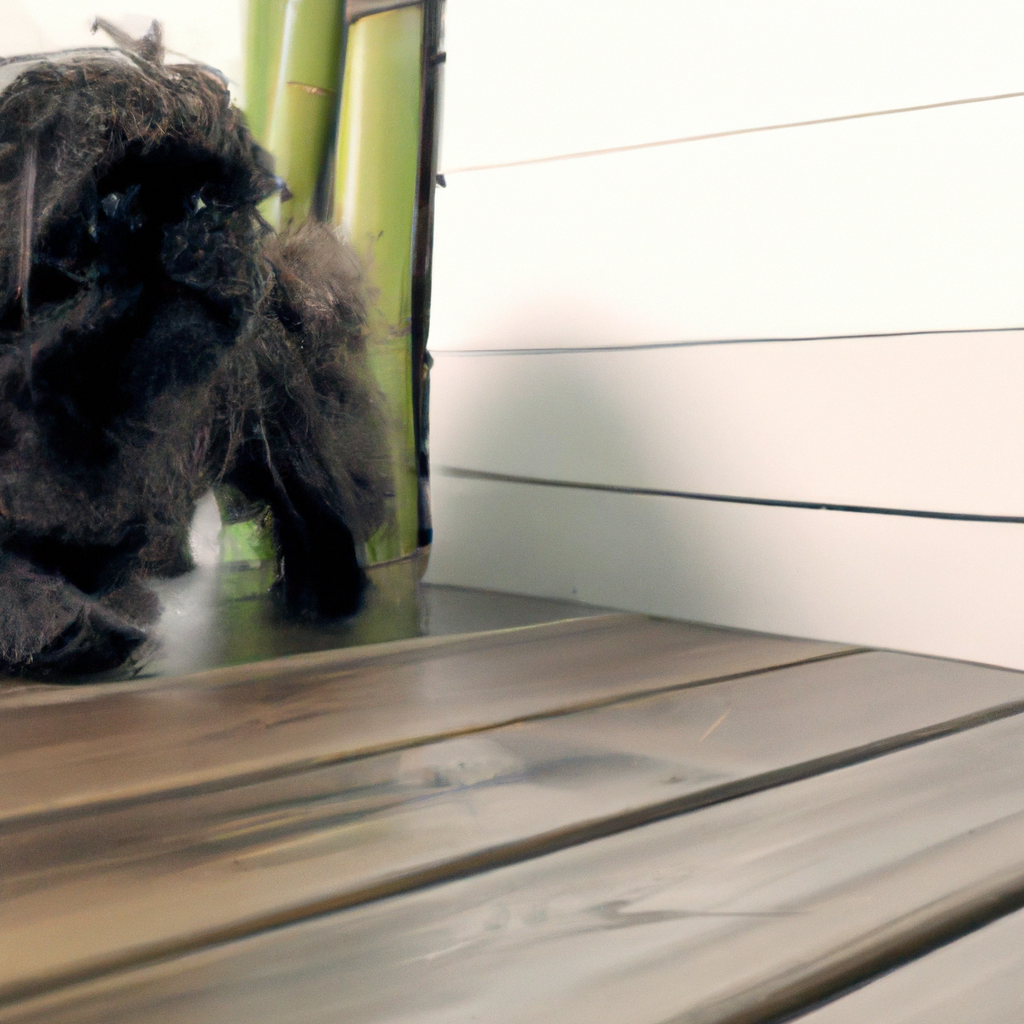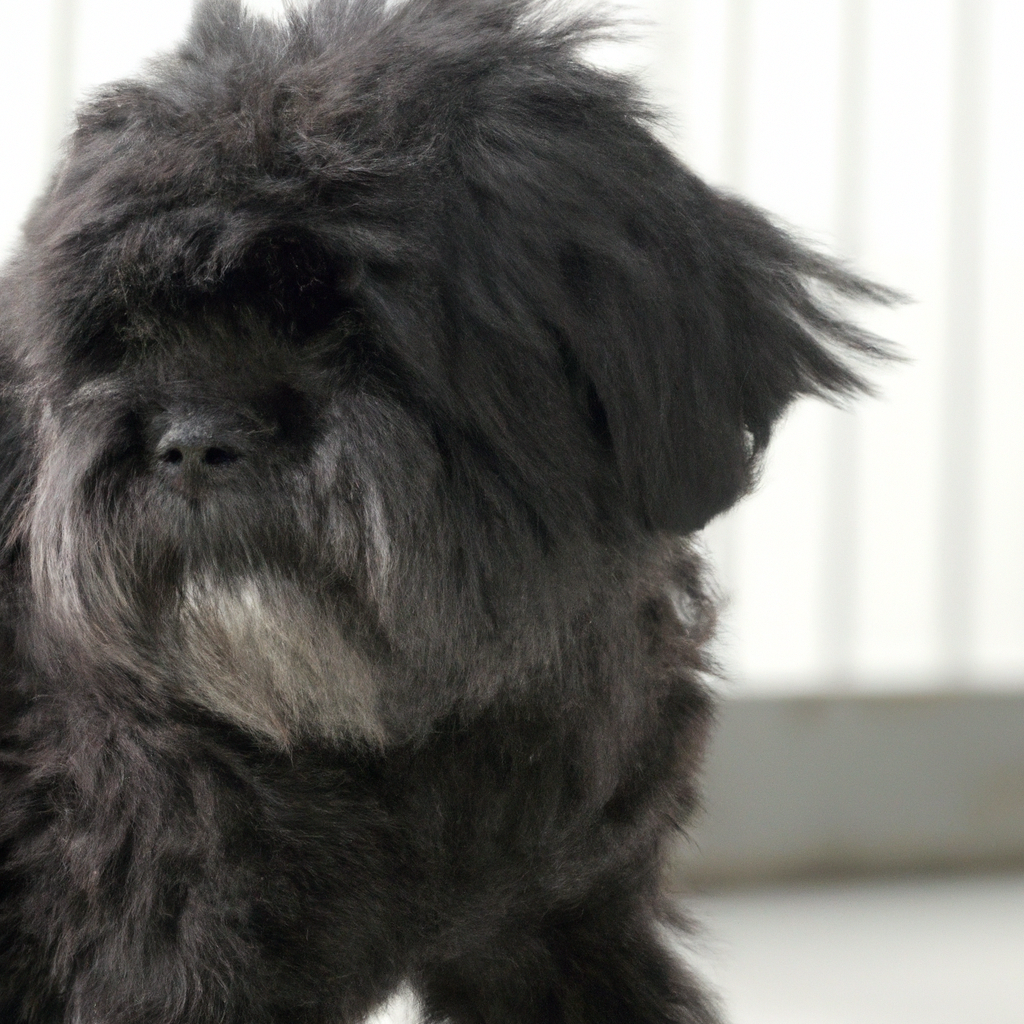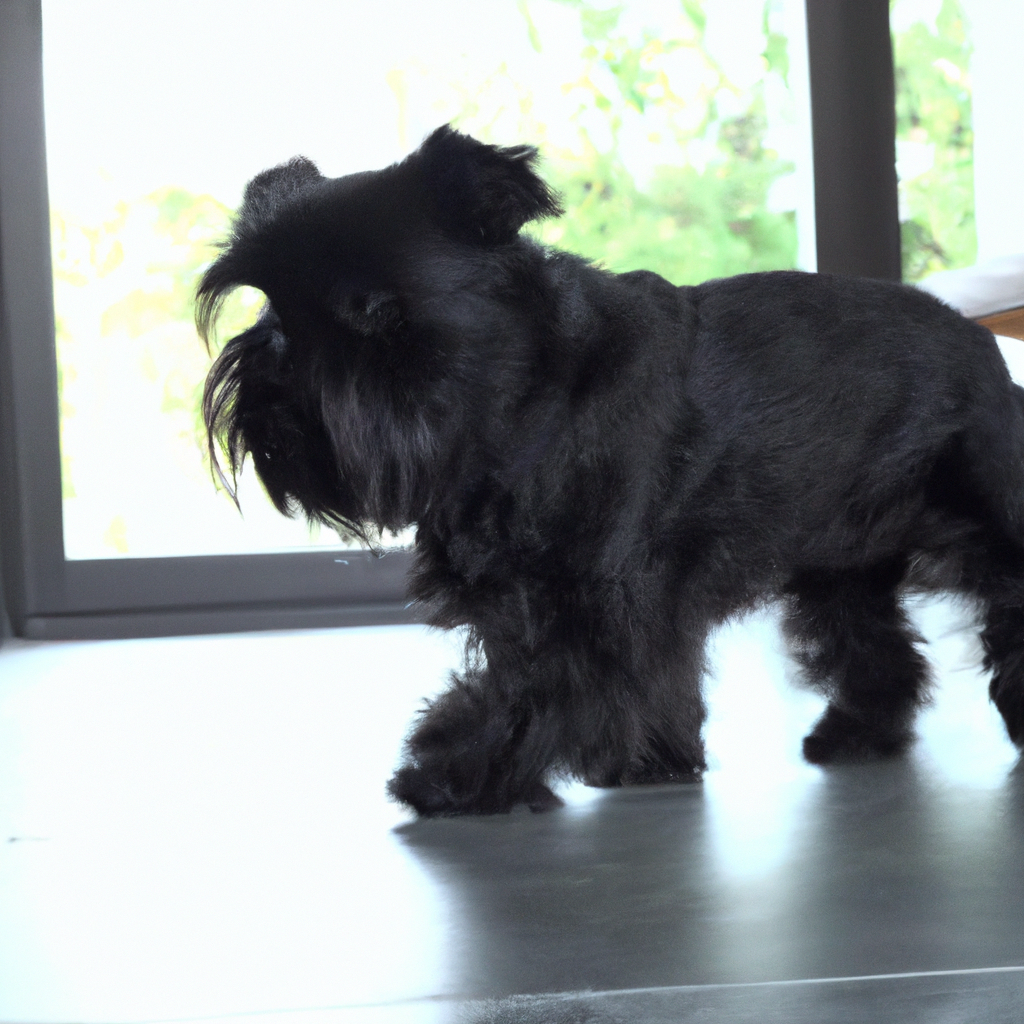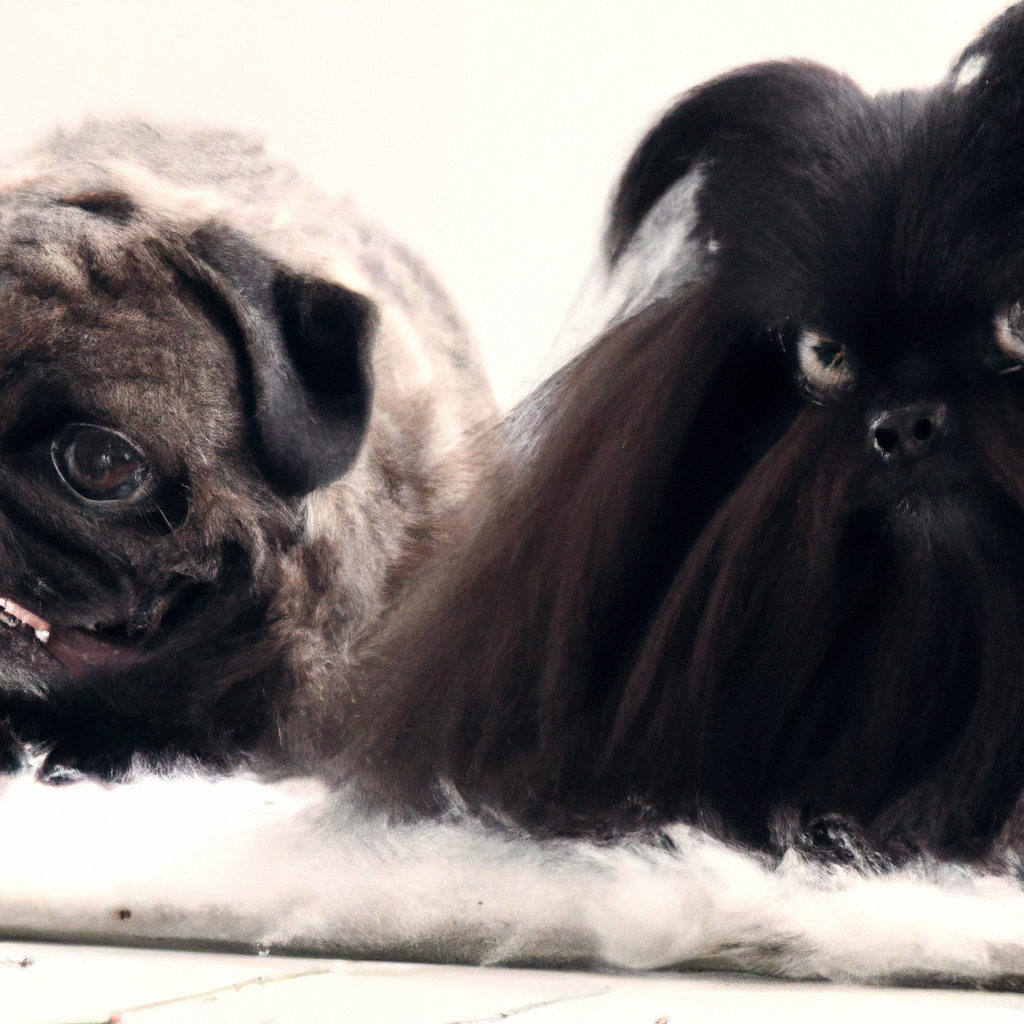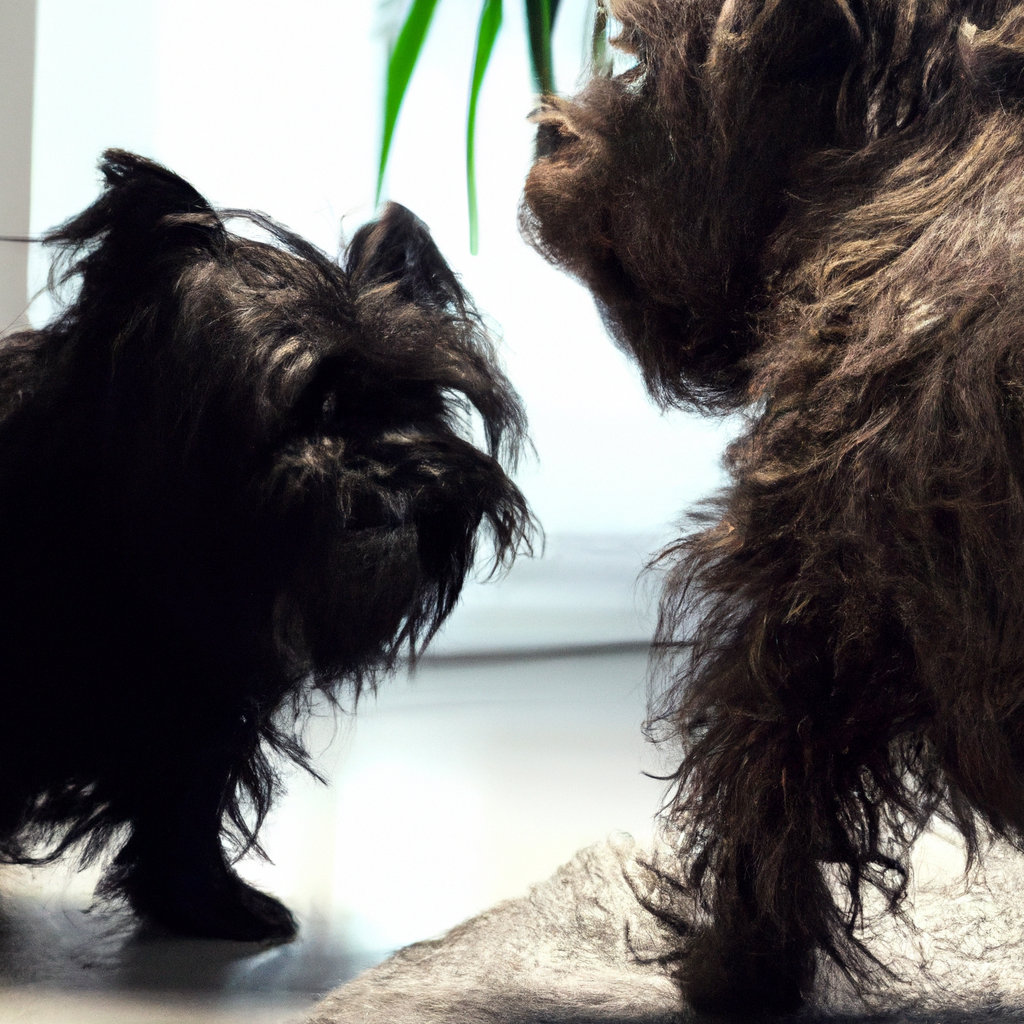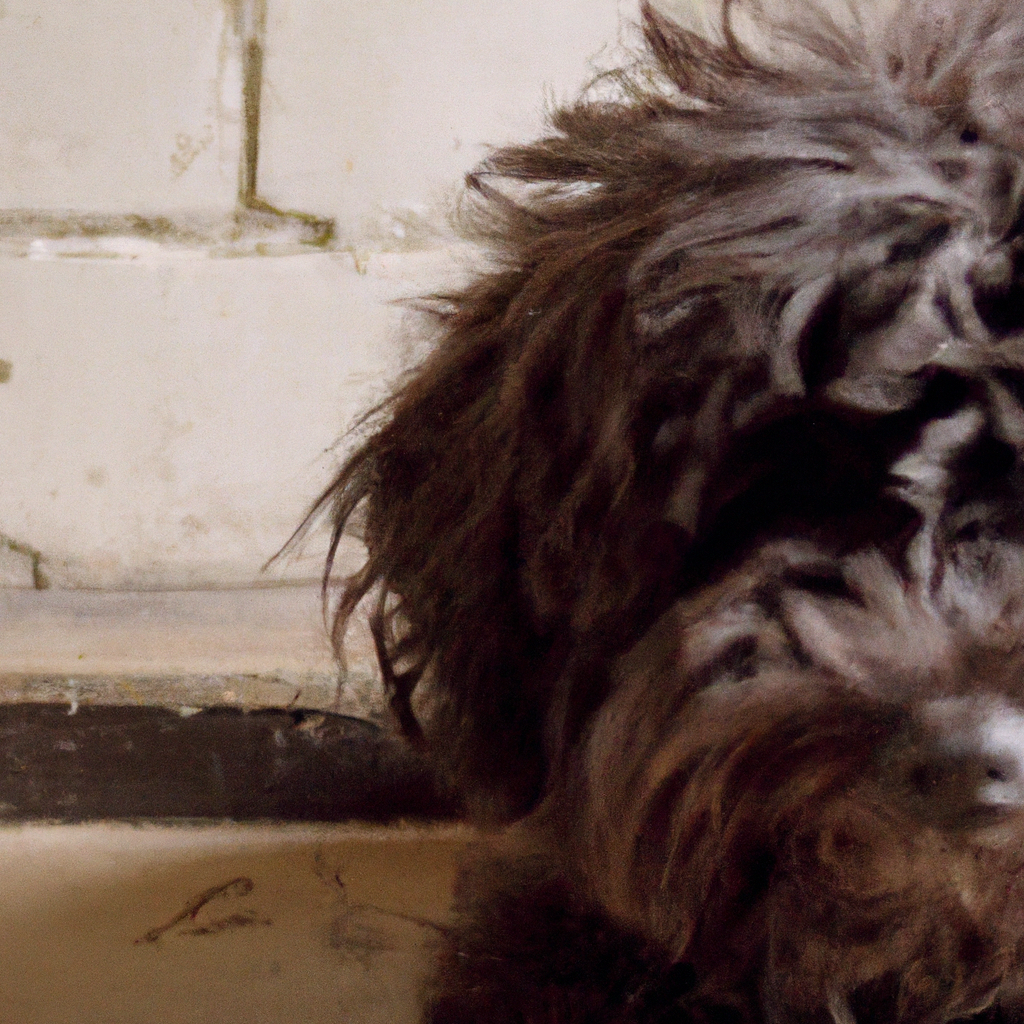Affenpinschers, also known as “Monkey Terriers,” are small but assertive dogs known for their distinctive appearance and spirited personality. While they can make excellent companions, there can be potential challenges when it comes to their interaction with other pets. These challenges primarily stem from their strong-willed and territorial nature, which can lead to confrontations with other animals. Additionally, their small size makes them vulnerable to injuries from larger pets. Affenpinschers may also exhibit a high prey drive, which can cause issues with smaller pets such as rodents or birds. Understanding these potential challenges is crucial for ensuring harmonious cohabitation between Affenpinschers and other pets.
Understanding Affenpinscher’s Aggression Towards Other Pets
Affenpinschers, often referred to as “Monkey Terriers” due to their distinct primate-like appearance, are small but mighty dogs known for their playful and adventurous spirit. However, their interaction with other pets can sometimes be a bit challenging due to their inherent territorial nature and high energy levels. Understanding the potential challenges with Affenpinscher interaction with pets is crucial for pet owners who wish to maintain a harmonious multi-pet household.
Affenpinschers are known for their bold and protective nature, which can sometimes translate into aggression towards other pets. This is particularly true when they feel their territory is being threatened. They are fiercely loyal to their human family and can become quite possessive, which can lead to confrontations with other pets. This is not to say that all Affenpinschers will exhibit this behavior, but it is a trait that is common within the breed.
One of the main challenges with Affenpinschers is their high energy levels. These dogs are always on the go and require plenty of physical and mental stimulation. If they don’t get enough exercise, they can become bored and restless, which can lead to destructive behavior. This can be a problem if you have other pets in the house that are not as active or if your Affenpinscher decides to take out their energy on your other pets.
Another challenge is their strong prey drive. Affenpinschers were originally bred to hunt rats and other small vermin, and this instinct can still be strong in some dogs. This can be a problem if you have smaller pets like hamsters, guinea pigs, or birds. Your Affenpinscher may see these pets as prey rather than companions, which can lead to dangerous situations.
Socialization is key when it comes to mitigating these potential challenges. The more positive experiences your Affenpinscher has with other pets, the more likely they are to get along with them. It’s important to introduce new pets slowly and under controlled conditions to ensure that everyone gets along. Training can also be beneficial. Teaching your Affenpinscher basic commands like “leave it” can help control their prey drive and prevent them from becoming too possessive.
Despite these challenges, it’s important to remember that every Affenpinscher is an individual and not all will exhibit these behaviors. Many Affenpinschers live happily with other pets and enjoy their company. It’s all about understanding your dog’s individual personality and needs and ensuring they are met.
In conclusion, while Affenpinschers can present certain challenges when interacting with other pets, these can be managed with proper socialization, training, and understanding of their inherent traits. These small but spirited dogs can make wonderful companions, and with a little patience and effort, they can coexist peacefully with other pets. After all, their endearing qualities and unique charm make all the effort worthwhile.
Dealing with Affenpinscher’s Dominant Behavior with Other Animals
Affenpinschers, often referred to as “Monkey Terriers” due to their distinct primate-like appearance, are small but mighty dogs known for their playful and adventurous nature. However, their interaction with other pets can sometimes be a bit challenging due to their dominant behavior. This article aims to shed light on the potential challenges you might face when your Affenpinscher interacts with other pets and how to deal with them effectively.
Affenpinschers are known for their bold and assertive nature. Despite their small size, they have a big-dog attitude and are not afraid to stand their ground. This dominant behavior can sometimes lead to conflicts when they interact with other pets, especially those of the same or larger size. They may try to assert their dominance over other pets, leading to potential squabbles.
This dominant behavior is a part of their natural instinct. Affenpinschers were originally bred to hunt rats and other small vermin, so they have a strong prey drive. This can sometimes cause problems when they are around smaller pets like hamsters, guinea pigs, or birds. They may see these pets as prey rather than companions, which can lead to aggressive behavior.
Another challenge with Affenpinschers is their territorial nature. They are very protective of their space and belongings, and they may not take kindly to other pets encroaching on their territory. This can lead to confrontations and fights if not properly managed.
So, how can you deal with an Affenpinscher’s dominant behavior with other animals? The key is early socialization and training. Introduce your Affenpinscher to other pets at a young age, so they can learn to get along with them. Make sure these introductions are done in a controlled environment and under close supervision to prevent any potential conflicts.
Training is also crucial in managing an Affenpinscher’s dominant behavior. Teach them basic obedience commands like “sit”, “stay”, and “leave it”. These commands can help you control your Affenpinscher’s behavior around other pets and prevent any aggressive actions.
It’s also important to establish yourself as the pack leader. Affenpinschers are more likely to respect other pets if they see that you are in charge. Be firm but fair in your interactions with your Affenpinscher, and make sure they understand that aggressive behavior towards other pets is not acceptable.
In addition, try to provide your Affenpinscher with plenty of physical and mental stimulation. A bored Affenpinscher is more likely to exhibit dominant behavior. Regular exercise and playtime can help keep your Affenpinscher happy and well-behaved.
Lastly, remember that every Affenpinscher is unique. Some may get along well with other pets, while others may struggle. It’s important to be patient and persistent in your efforts to help your Affenpinscher interact positively with other pets.
In conclusion, while Affenpinschers can sometimes exhibit dominant behavior with other pets, this can be managed with early socialization, training, and proper leadership. With patience and understanding, your Affenpinscher can learn to get along with other pets, leading to a harmonious multi-pet household.
Affenpinscher’s Territorial Issues: A Challenge to Pet Interaction
Affenpinschers, often referred to as “Monkey Dogs” due to their distinctive, primate-like appearance, are a small breed of dog that originated in Germany. Known for their playful and adventurous nature, these dogs are a popular choice for pet owners. However, like any breed, Affenpinschers come with their own unique set of challenges, particularly when it comes to interacting with other pets. One of the most notable issues is their territorial nature, which can pose a significant challenge to harmonious pet interaction.
Affenpinschers are known for their strong territorial instincts. This trait, while beneficial in some respects, can lead to problems when these dogs are expected to share their space with other pets. They are fiercely protective of their territory, which includes not only their physical space but also their toys, food, and even their human family members. This can lead to conflicts with other pets, particularly those of the same or smaller size, who may not understand or respect the Affenpinscher’s territorial boundaries.
This territorial behavior is deeply ingrained in the Affenpinscher’s nature and is not something that can be easily trained out of them. However, it can be managed with the right approach. Early socialization is key. Introducing your Affenpinscher to a variety of different animals and environments from a young age can help them become more comfortable with sharing their space. It’s also important to establish clear boundaries and ensure that all pets have their own designated areas where they can retreat to when they need some alone time.
Another challenge with Affenpinschers is their high energy levels. These dogs are active and playful, and they require plenty of mental and physical stimulation to keep them happy and healthy. This can be a problem if they are expected to coexist with more sedate pets who may not appreciate the Affenpinscher’s boisterous play style. It’s important to ensure that your Affenpinscher gets plenty of exercise and has a variety of toys to keep them occupied. This can help to prevent them from becoming bored and taking out their energy on other pets.
Despite these challenges, it’s important to remember that every Affenpinscher is an individual and will have their own unique personality and behavior traits. Some may be more territorial or energetic than others. It’s also worth noting that while these traits can pose challenges, they are also part of what makes Affenpinschers such a unique and endearing breed. Their protective nature can make them excellent watchdogs, and their playful energy can bring a lot of joy and entertainment to a household.
In conclusion, while Affenpinschers can pose certain challenges when it comes to interacting with other pets, these issues can be managed with the right approach. Early socialization, clear boundaries, and plenty of mental and physical stimulation can all help to ensure that your Affenpinscher can coexist peacefully with other pets. And despite their territorial nature and high energy levels, these traits are also part of what makes Affenpinschers such a special and beloved breed.
The Struggle with Affenpinscher’s High Energy Levels and Other Pets
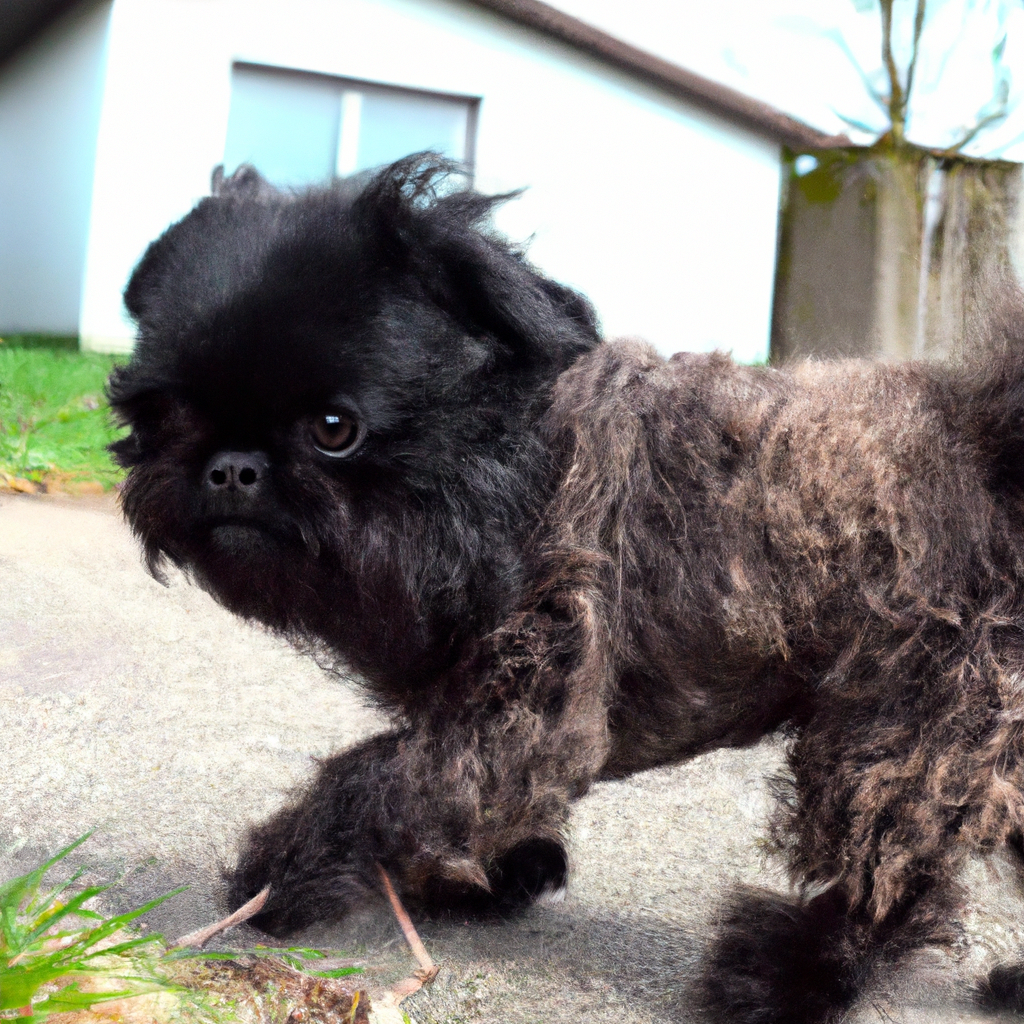
Affenpinschers, also known as “Monkey Terriers,” are small but mighty dogs known for their distinctive appearance and high energy levels. While these traits make them endearing to many pet owners, they can also present challenges when it comes to interacting with other pets.
Affenpinschers are naturally energetic and playful, which can be a delight to watch. However, their high energy levels can sometimes be overwhelming for other pets, particularly those that are more laid-back or older. This can lead to tension or conflict, as the other pets may feel threatened or annoyed by the Affenpinscher’s constant need for play and attention.
Moreover, Affenpinschers are known for their strong-willed and independent nature. They are not afraid to stand their ground, even when faced with larger animals. This can be problematic when they interact with other pets, as they may not back down from a confrontation. This stubbornness can lead to fights or other aggressive behaviors, which can be stressful for both the pets and their owners.
Another potential challenge is the Affenpinscher’s natural hunting instincts. These dogs were originally bred to hunt rats and other small vermin, and they still retain these instincts today. This means that they may see smaller pets, such as hamsters or birds, as prey rather than companions. This can obviously lead to dangerous situations if not properly managed.
Furthermore, Affenpinschers are known for their territorial nature. They can be possessive of their toys, food, and even their favorite spots in the house. This can lead to conflicts with other pets who may not understand or respect these boundaries.
Despite these potential challenges, it’s important to remember that every Affenpinscher is unique and may not exhibit all of these behaviors. Many Affenpinschers live happily with other pets, especially when they are properly socialized from a young age.
If you’re considering adding an Affenpinscher to a household with other pets, there are several strategies you can use to help ensure a smooth transition. First, introduce the new pet slowly and under controlled conditions. This can help prevent any initial conflicts and allow the pets to get used to each other’s presence.
Second, provide plenty of opportunities for the Affenpinscher to burn off their energy. Regular walks, playtime, and mental stimulation can help keep their high energy levels in check and reduce the likelihood of conflicts with other pets.
Third, establish clear boundaries and rules for all pets in the household. This can help prevent territorial disputes and ensure that all pets feel safe and secure in their environment.
Finally, consider seeking professional help if needed. A professional dog trainer or behaviorist can provide valuable insights and strategies for managing potential conflicts and ensuring a harmonious household.
In conclusion, while Affenpinschers can present certain challenges when interacting with other pets, these can often be managed with the right strategies and understanding of their unique behaviors. With patience, consistency, and a little bit of professional guidance, Affenpinschers can make wonderful additions to multi-pet households.
Affenpinscher and Cats: Potential Problems and Solutions
Affenpinschers, often referred to as “Monkey Terriers” due to their distinct primate-like appearance, are a small breed of dog known for their playful and adventurous nature. While they are generally friendly and sociable, they can sometimes exhibit certain behaviors that may pose challenges when interacting with other pets, particularly cats.
One of the potential problems that may arise when an Affenpinscher interacts with a cat is their inherent hunting instinct. This breed was originally developed to hunt rats and other small vermin, and this instinct can sometimes be triggered when they encounter cats. This can lead to chasing, which can be stressful for the cat and potentially dangerous if it escalates into a fight.
Another issue that can arise is the Affenpinscher’s territorial nature. These dogs are known to be quite protective of their space and their owners, which can lead to conflict if a cat encroaches on what the dog perceives as its territory. This can result in aggressive behavior, such as growling, barking, or even biting.
Moreover, Affenpinschers are known for their high energy levels and playful nature. While this can make them great companions, it can also lead to problems if they become too boisterous or rough in their play with a cat. Cats generally prefer a more relaxed and calm environment, and the energetic play of an Affenpinscher can be overwhelming and stressful for them.
Despite these potential challenges, it’s important to note that every Affenpinscher is unique and not all will exhibit these behaviors. Furthermore, there are several strategies that can be employed to mitigate these issues and promote a harmonious relationship between an Affenpinscher and a cat.
Firstly, early socialization is key. Introducing an Affenpinscher to a cat at a young age can help them learn to interact appropriately and peacefully. This should be done gradually and under close supervision to ensure the safety of both animals.
Secondly, training can be very beneficial. Teaching an Affenpinscher basic commands such as “leave it” or “stay” can help control their behavior around a cat. Positive reinforcement, such as treats or praise, can be used to reward good behavior and discourage unwanted actions.
Thirdly, providing separate spaces for each pet can help alleviate territorial issues. Each pet should have their own bed, food and water dishes, and toys. This can help reduce competition and conflict over resources.
Lastly, ensuring that both pets get plenty of exercise can help manage the Affenpinscher’s high energy levels. Regular walks and playtime can help tire out an Affenpinscher, making them less likely to engage in boisterous play with a cat.
In conclusion, while there can be potential challenges when an Affenpinscher interacts with a cat, these can be managed with early socialization, training, providing separate spaces, and ensuring adequate exercise. With patience and understanding, an Affenpinscher and a cat can coexist peacefully and even form a close bond.
Training Affenpinschers for Positive Interaction with Other Pets
Affenpinschers, often referred to as “Monkey Terriers” due to their distinctive, primate-like facial features, are a small but spirited breed of dog. Known for their playful and sometimes mischievous nature, these dogs can bring a lot of joy and laughter into a home. However, when it comes to interacting with other pets, Affenpinschers can present a few challenges.
Affenpinschers are naturally territorial and can be quite protective of their space and their human family. This trait, while endearing, can lead to issues when introducing a new pet into the household. The Affenpinscher may see the newcomer as an intruder, leading to aggressive behavior. This is particularly true if the new pet is another dog, as Affenpinschers can be especially wary of dogs they perceive as rivals.
Another potential challenge is the Affenpinscher’s high energy level. These dogs are known for their lively and spirited nature, which can sometimes be overwhelming for other pets. Cats, in particular, may find the Affenpinscher’s playful antics too much to handle, leading to stress and potential conflict.
Despite these challenges, it is possible to train an Affenpinscher to interact positively with other pets. The key is to start early and be consistent. If you’re introducing a new pet into a home with an Affenpinscher, it’s important to do so gradually. Allow the Affenpinscher to get used to the new pet’s scent before they meet face-to-face. This can help reduce the Affenpinscher’s territorial instincts and make the introduction smoother.
When they do meet, it’s crucial to supervise their interactions closely. Reward the Affenpinscher for calm, non-aggressive behavior to reinforce positive interactions. If the Affenpinscher shows signs of aggression, it’s important to intervene immediately, but calmly. Never punish the Affenpinscher for aggressive behavior, as this can exacerbate the problem. Instead, redirect their attention and reward them when they calm down.
Training an Affenpinscher to interact positively with other pets also involves managing their energy levels. Regular exercise can help burn off excess energy and reduce the likelihood of the Affenpinscher overwhelming other pets. This can be as simple as a daily walk or a game of fetch in the backyard.
Socialization is another crucial aspect of training. Exposing the Affenpinscher to a variety of different animals in a controlled environment can help them learn to interact positively with other pets. This could involve regular visits to a dog park or arranging playdates with friends or family who have pets.
In conclusion, while Affenpinschers can present some challenges when it comes to interacting with other pets, these issues can be managed with patience, consistency, and proper training. By understanding the Affenpinscher’s natural instincts and working with them, rather than against them, you can help your Affenpinscher learn to live harmoniously with other pets. Remember, every dog is unique and what works for one might not work for another. It’s always a good idea to consult with a professional dog trainer or behaviorist if you’re having trouble. With time and effort, your Affenpinscher can learn to be a friendly and respectful member of your multi-pet household.
Affenpinscher’s Possessiveness: A Barrier to Harmonious Pet Interaction
Affenpinschers, often referred to as “Monkey Terriers” due to their distinct primate-like appearance, are small but mighty dogs known for their playful and adventurous spirit. However, their interaction with other pets can sometimes be challenging due to their inherent possessiveness. This trait, while endearing to some, can create a barrier to harmonious pet interaction, and it’s essential for potential Affenpinscher owners to understand this aspect of their personality.
Affenpinschers are known for their strong sense of ownership, particularly when it comes to their toys, food, and even their human family members. This possessiveness is a natural part of their breed’s character, stemming from their history as ratters in 17th-century Germany. Back then, these dogs had to be tenacious and protective of their catch, traits that have carried over into their modern-day personalities.
This possessiveness can manifest in various ways. For instance, an Affenpinscher may become defensive if another pet approaches their food or toys, leading to potential conflicts. They may also become jealous if they perceive that another pet is receiving more attention or affection from their human family members. This can lead to behavioral issues such as aggression or anxiety, which can disrupt the harmony in a multi-pet household.
However, it’s important to note that every Affenpinscher is unique, and not all will display high levels of possessiveness. Many factors can influence a dog’s behavior, including their upbringing, socialization, and individual temperament. Therefore, it’s crucial not to make assumptions about an Affenpinscher’s behavior based solely on their breed.
Despite these potential challenges, there are ways to manage an Affenpinscher’s possessiveness to promote harmonious pet interaction. One effective strategy is early socialization. Introducing an Affenpinscher to a variety of other animals at a young age can help them learn to share and coexist peacefully. Regular training can also be beneficial, teaching the dog to follow commands and respect boundaries.
Another useful approach is to ensure that each pet in the household has their own space and resources. This includes separate feeding areas, individual toys, and distinct sleeping areas. By doing this, you can help reduce potential sources of conflict and help your Affenpinscher feel more secure.
It’s also important to provide plenty of positive reinforcement. Rewarding your Affenpinscher for good behavior, such as sharing or being gentle with other pets, can help encourage more of the same. Remember, patience is key. Changing behavior takes time, and it’s important to remain consistent and positive in your approach.
In conclusion, while Affenpinschers’ possessiveness can present challenges in multi-pet households, it’s by no means an insurmountable obstacle. With understanding, patience, and the right strategies, it’s entirely possible to manage this trait and foster a peaceful coexistence between an Affenpinscher and other pets. After all, beneath their feisty exterior, Affenpinschers are loving and loyal companions who can bring immense joy and laughter into any home.
Addressing Affenpinscher’s Fear and Anxiety Around Other Pets
Affenpinschers, often referred to as “Monkey Terriers” due to their distinct primate-like appearance, are small but spirited dogs known for their playful and sometimes stubborn nature. While they are generally sociable and can get along well with humans, they may exhibit fear and anxiety when interacting with other pets. This can pose potential challenges for pet owners who have multiple pets at home or are considering introducing a new pet into the family.
Affenpinschers are naturally territorial and protective of their space. This trait, while beneficial in some respects, can lead to issues when they are forced to share their environment with other pets. They may perceive the new pet as a threat to their territory, leading to feelings of fear and anxiety. This can manifest in various ways, such as aggressive behavior, excessive barking, or even attempts to hide or escape.
One of the main reasons for this fear and anxiety is the Affenpinscher’s small size. Despite their bold and fearless nature, their petite stature can make them feel vulnerable around larger pets. This is especially true if the other pet is a larger dog breed or a cat, both of which can be intimidating to a small Affenpinscher.
Another factor contributing to an Affenpinscher’s fear and anxiety around other pets is their inherent high energy levels. Affenpinschers are known for their lively and energetic nature, which can sometimes be overwhelming for other pets. If the other pet is not as active or playful, the Affenpinscher may become anxious, fearing that their energetic behavior is not being reciprocated.
So, how can pet owners address these potential challenges? The key lies in gradual and controlled exposure. Introducing the Affenpinscher to the new pet slowly and in a controlled environment can help alleviate their fear and anxiety. Start by allowing them to observe each other from a distance, gradually decreasing the distance over time as they become more comfortable with each other’s presence.
It’s also important to monitor their interactions closely, especially in the early stages. If the Affenpinscher shows signs of fear or anxiety, such as growling or hiding, it’s best to separate them and try again later. Patience is key in these situations, as forcing the interaction can exacerbate the Affenpinscher’s fear and anxiety.
Reward-based training can also be beneficial in these situations. Rewarding the Affenpinscher for calm and positive behavior around the other pet can reinforce the idea that the presence of the other pet is a positive thing. This can help reduce their fear and anxiety over time.
In conclusion, while Affenpinschers may initially exhibit fear and anxiety around other pets, these challenges can be overcome with patience, controlled exposure, and positive reinforcement. By understanding their unique traits and behaviors, pet owners can help their Affenpinschers adapt to the presence of other pets, leading to a harmonious and happy household.In conclusion, potential challenges with Affenpinschern interaction with other pets may include their strong-willed and territorial nature, which can lead to aggression if not properly managed. Their small size also makes them vulnerable to injury from larger pets. Additionally, their high energy levels and playfulness might be overwhelming for some pets. Therefore, careful supervision and proper socialization are crucial when introducing an Affenpinscher to other pets.
